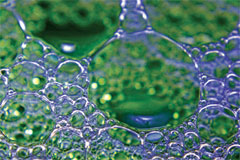
In the Republic of Korea, there has been a steady increase in the use of chemicals, including more than 40,000 kinds of chemicals in circulation and the entry of about 400 new chemicals in the Korean market every year. However, some of the chemicals are very harmful to humans and can be the cause of cancer, respiratory disease, nervous system disorder, etc.
Countries started to prohibit and restrict the import/export, manufacturing and use of raw materials, products and wastes of certain hazardous chemicals through the Basel Convention, the Rotterdam Convention, and the Stockholm Convention. The Republic of Korea has ratified these three conventions in its domestic law and is implementing policies to manage hazardous chemicals and wastes.
The Basel, Rotterdam and Stockholm conventions share the common vision of effective management of hazardous chemicals and wastes, but each convention has a different background concerning substances, management purposes, etc. In order to implement the conventions, the Republic of Korea ᆳment methods foreseen in the conventions. For example, the Stockholm Convention prohibits the import and export of hazardous substances, such as Aldrin and Eldrin, but it is difficult to manage those substances given that the registration or approval procedures of the substances are not specified. In addition, the Basel Convention restricts the import and export of wastes containing for example PCBs, but the disposal of those wastes is not prescribed in detail. In other words, if there is no appropriate treatment technology available domestically or abroad, the wastes cannot be disposed and should be stored appropriately.
The Republic of Korea amended the Toxic Chemicals Control Act to establish a system that met the purpose of prohibiting the import and export of certain substances under the Stockholm Convention. To achieve this, certain substances under the Rotterdam Convention and the Stockholm Convention were classified and listed as prohibited or restricted substances and prior notifications were requested for exporting these substances.
In addition, the Persistent Organic Pollutants Management Act was passed and a technology for waste transformers containing PCBs was specified to allow appropriate disposal of wastes containing technologies for waste transformers containing PCBs, which had been controversial before, were verified, and the specialization of chemical and cleaning treatments was enhanced with the establishment of 12 special treatment companies in Korea . As a result, about 140,000 waste transformers were disposed of in 2010. In order to reduce the environmental pollution in the world caused by the export of waste transformers containing PCBs, there are plans to implement the management policies on used products containing persistent organic pollutants (pending the National Assembly’s approval of the bill).
The Republic of Korea is striving to achieve close cooperation by integrating issues related to the Stockholm Convention and the Rotterdam Convention at the level of the Chemicals management division of the Ministry of Environment. On the other hand, the Resource Recirculation Policy Division of the Ministry of Environment is responsible for the affairs related to the Basel Convention.
The three conventions are different in terms of concerned substances and management methods, but they have the common vision of reducing risks of hazardous chemicals and wastes to human health and the environment. In order to achieve their shared aim, it is necessary to classify common criteria to unify the management plan and establish policies that the stakeholders can understand easily and implement smoothly. The Republic of Korea will work towards minimizing the redundancy and inefficiency of policies to ensure the environmental pollution caused by chemicals and wastes is reduced.